 Petzlover
Petzlover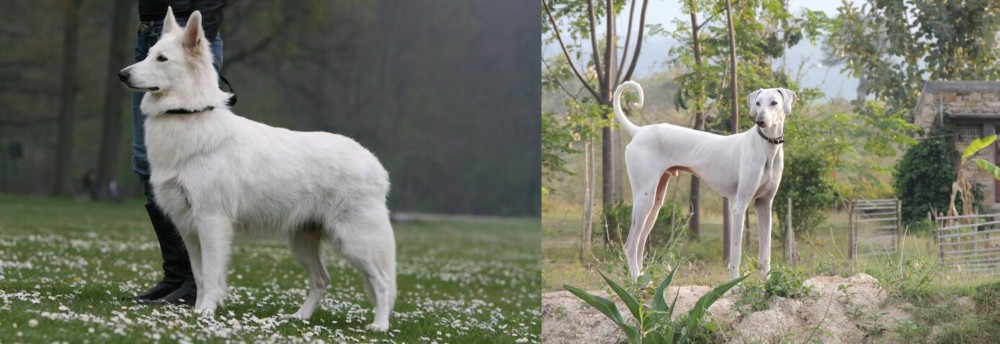 Berger Blanc Suisse is originated from Switzerland but Chippiparai is originated from India. Both Berger Blanc Suisse and Chippiparai are having almost same height. Berger Blanc Suisse may weigh 20 kg / 45 pounds more than Chippiparai. Berger Blanc Suisse may live 3 years less than Chippiparai. Both Berger Blanc Suisse and Chippiparai has almost same litter size. Berger Blanc Suisse requires Moderate Maintenance. But Chippiparai requires Low Maintenance
Berger Blanc Suisse is originated from Switzerland but Chippiparai is originated from India. Both Berger Blanc Suisse and Chippiparai are having almost same height. Berger Blanc Suisse may weigh 20 kg / 45 pounds more than Chippiparai. Berger Blanc Suisse may live 3 years less than Chippiparai. Both Berger Blanc Suisse and Chippiparai has almost same litter size. Berger Blanc Suisse requires Moderate Maintenance. But Chippiparai requires Low Maintenance
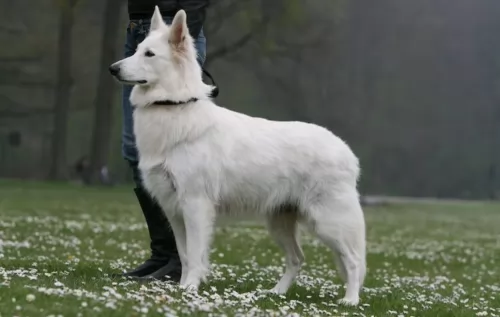 The Berger Blanc Suisse is also referred to as the White Swiss Shepherd. The dog shares the same ancestry with the German Shepherd. The beautiful white dog from Switzerland, is closely related to the White Shepherd. Both breeds are descended from the German Shepherd breed.
The Berger Blanc Suisse is also referred to as the White Swiss Shepherd. The dog shares the same ancestry with the German Shepherd. The beautiful white dog from Switzerland, is closely related to the White Shepherd. Both breeds are descended from the German Shepherd breed.
It was in 1967 that a certain Agatha Burch brought a White German Shepherd with her to Switzerland and also importing a female white German Shepherd from the UK. It was these 2 dogs who were believed to be the first breeding dogs for the Berger Blanc Suisse. After a number of years, the breed was officially recognized in July 2011. In the USA and Canada, these White Shepherd dogs have been accepted as a distinct breed.
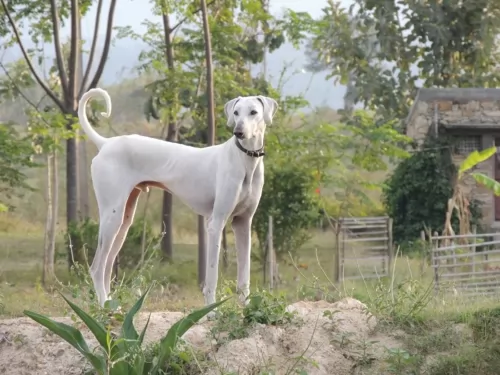 The Chippiparai is a working dog found in India and until recently there has been little interest in the purity of any breed, but rather only an emphasis on the abilities of the dog. They are only beginning to research the origin and history of their native dogs such as the Chippiparai. Not much is known about the origin of the breed except that it is found almost exclusively in Tamil Nadu and Keraia in the southern part of the subcontinent of India. Other than this there is much speculation about the breed’s origin but very little-known facts. It is indeed an ancient breed; however, its origin could be thousands of years ago or simply hundreds of years ago.
The Chippiparai is a working dog found in India and until recently there has been little interest in the purity of any breed, but rather only an emphasis on the abilities of the dog. They are only beginning to research the origin and history of their native dogs such as the Chippiparai. Not much is known about the origin of the breed except that it is found almost exclusively in Tamil Nadu and Keraia in the southern part of the subcontinent of India. Other than this there is much speculation about the breed’s origin but very little-known facts. It is indeed an ancient breed; however, its origin could be thousands of years ago or simply hundreds of years ago.
• Perhaps it is a descendant of the Saluki as it resembles this breed quite a bit. It has been believed for some time that the Saluki is the original sighthound and the source of all sighthound breeds. The Saluki was very popular in the Middle East, especially in Persia and Arabia from which it could easily have spread to India. It would then have been shared from Northern India to Southern India where the Chippiparai is found.
• Perhaps the Chippiparai is a descendent of sighthounds from Central Asia and Afghanistan – the Tazi, Taigan, Hortaya Borsaya or the Afghan Hound. This part of Central Asia had more trade, influence and contact with the Indian subcontinent early in their history than with any other region. The Chippiparai is considered by some to be more like these sighthounds than like the Saluki and the interaction between these regions has a much longer history than the Middle East and India.
• It is also speculated that the Chippiparai might have been developed completely and uniquely from the local street and working dogs. With the civilization of India being one of the oldest in the world, it is considered a possibility that the Chippiparai is the descendent of the Harappan hunting dogs that probably were developed by the Indus Valley or Harappa roiling class.
Wherever the Chippiparai came from, they were the exclusive property of the wealthy and ruling castes. These upper castes were the only ones that could legally hunt with dogs or afford to feed one. The royal classes of Tiruneivell, Thanjavur, and Madurai all fed the popularity of the breed among the upper castes. They were coursing dogs used to chase down the prey once it was sighted. The Chippiparai are incredibly fast runners and would catch almost any prey and either hold it or kill it for their hunter. The Chippiparai, when not hunting, had to be chained so they would not chase any small animal that they saw. This confinement also added to the purity of the breed as random breeding was prevented.
The southern part of the Indian subcontinent is extremely hot with routine temperatures over 100’. The Chippiparai was developed to withstand these extreme temperatures and is more heat tolerant than most any other breed. They also need very little food and are resistant to the many parasites and diseases found in southern India.
Harboring the belief that Indian dogs were not as good as European ones, the occupying countries of Portugal, France, and Britain, had no interest in the Chippiparai, again leaving the breed to develop naturally on their own with little or no interbreeding. They also received no formal recognition because Indian culture only valued the dog for its working abilities. There was no Indian Kennel Club until 1956.
The Chippiparai is now very rarely and only found in the area of its birth. Many believe the breed is in danger of becoming extinct and even though it is now registered with Indian Kennel Clubs it is not often shown in their dog shows. Lovers of the breed are now attempting to get Indians to recognize that the Chippiparai is a great companion animal and attempting to save the breed.
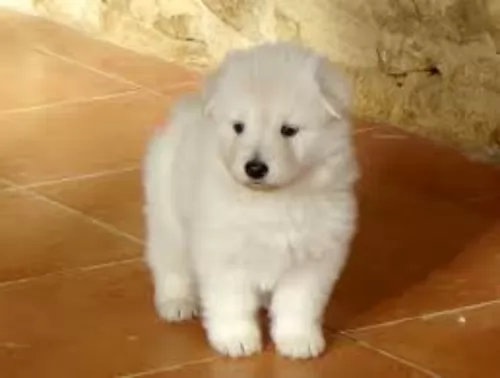 The medium-sized, well muscled Berger Blanc Suisse looks so much like the popular German Shepherd, and apart from its white coat, it has much the same physical standards. The females are about 55–61cm in height while the males are 60–66cm in height. The dogs dense, medium-length double coat tends to be slightly wavy but straight is more common. He has a long bushy tail.
The medium-sized, well muscled Berger Blanc Suisse looks so much like the popular German Shepherd, and apart from its white coat, it has much the same physical standards. The females are about 55–61cm in height while the males are 60–66cm in height. The dogs dense, medium-length double coat tends to be slightly wavy but straight is more common. He has a long bushy tail.
The Berger Blanc Suisse is somewhat longer than it is tall, but like the German Shepherd, it also has erect ears. In contrast to the white coat, the nose is black and the dog had dark, alert eyes.
This is an intelligent, confident dog and if you buy a puppy, of which the average litter size is 8, you will need to provide training and socialization to ensure he doesn't act totally independently and behave in a manner not pleasing to you. Once he is trained and socialized, he makes a wonderful pet and is social, playful and gentle. He is loyal and devoted to his human family, wanting to protect them. He is good around children and other pets in the home.
 The Chippiparai is a typical sighthound although their size and appearance will vary more than that of registered purebred sighthounds. Typically, they will have a long, domed head with small erect ears and dark eyes. Their muzzle will be as deep and wide as the skull but longer. Their legs are straight and long, their chest is roached back and deep, giving them, an appearance very similar to a greyhound or other sighthound.
The Chippiparai is a typical sighthound although their size and appearance will vary more than that of registered purebred sighthounds. Typically, they will have a long, domed head with small erect ears and dark eyes. Their muzzle will be as deep and wide as the skull but longer. Their legs are straight and long, their chest is roached back and deep, giving them, an appearance very similar to a greyhound or other sighthound.
They have a long curly tail, and their coat can vary greatly in color. They are medium sized, and their coat is short, shiny and close. He is very slender and sleek, which along with his long legs gives him that incredible speed. They are thin with visible ribs.
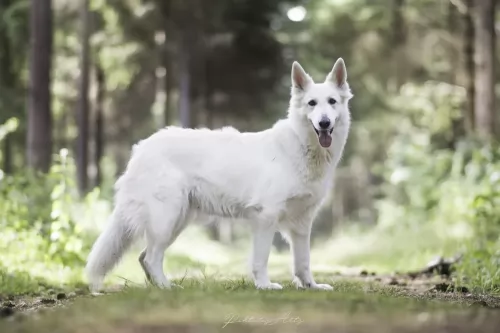 When you first set eyes on the Berger Blanc Suisse or White Shepherd, you can see that this is a strong, well-muscled, energetic dog, full of life and intelligent too. Add to that the fact that he is beautiful to look at.
When you first set eyes on the Berger Blanc Suisse or White Shepherd, you can see that this is a strong, well-muscled, energetic dog, full of life and intelligent too. Add to that the fact that he is beautiful to look at.
Your Berger Blanc Suisse dog is gentle and loyal with his own human family and will be somewhat wary of strangers. This dog is balanced, good-natured, friendly and affectionate and he just loves spending time with his family, being a good watch dog as well. He’s got so much going for him – good looks, a great personality, he is loyal, loving, strong, healthy and he’ll make one hang of a pet.
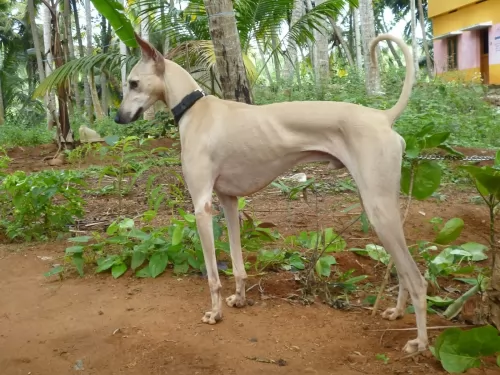 The Chippiparai is a loving, gentle family dog if well socialized, well trained and well exercised. They are very intelligent and need human companionship. Once they are living with a human family, they are very protective of that family. They are for the most part peaceful and quiet dogs. They are loyal and loving but they are not overly affectionate. Cuddlers they are not, and they do not like to play rough with children.
The Chippiparai is a loving, gentle family dog if well socialized, well trained and well exercised. They are very intelligent and need human companionship. Once they are living with a human family, they are very protective of that family. They are for the most part peaceful and quiet dogs. They are loyal and loving but they are not overly affectionate. Cuddlers they are not, and they do not like to play rough with children.
Accepting and loving within the family, the Chippiparai are equally hesitant and shy around strangers. They can be suspicious, but they are not aggressive. They are just very aloof with strangers, yet they hardly ever bark.
 Your White Swiss Shepherd is a healthy, energetic, strong dog, but even so when you find him lethargic and listless, you want to get him to the vet for a check-up. It is always a good idea to be alert to common dog illnesses so that you know what to look out for in your dog.
Your White Swiss Shepherd is a healthy, energetic, strong dog, but even so when you find him lethargic and listless, you want to get him to the vet for a check-up. It is always a good idea to be alert to common dog illnesses so that you know what to look out for in your dog.
A common problem with dogs. The dog becomes restless and the abdomen is often enlarged. Get your dog to the doctor immediately.
This is a developmental defect of the hip and elbow joints and you’ll notice your pet battling to rise again after lying down.
This is a disease of the nervous system where the hind legs and feet drag. Sometimes the dog loses control over the bladder.
 There are no clinical studies regarding the health and health history of the Chippiparai, so little is known about their long-term health. However, most who know the breed, believe it is an incredibly healthy one. They seem to have a lot less genetically transmitted health issues than other purebreds. Because of their isolation for centuries in India, they have developed immunities and resistance to most parasites and diseases other dog suffer from.
There are no clinical studies regarding the health and health history of the Chippiparai, so little is known about their long-term health. However, most who know the breed, believe it is an incredibly healthy one. They seem to have a lot less genetically transmitted health issues than other purebreds. Because of their isolation for centuries in India, they have developed immunities and resistance to most parasites and diseases other dog suffer from.
Because of this you should look for the types of issues that occur in dogs of this size and build. Have them tested by the Canine Eye Registration Foundation and the Orthopedic Foundation for Animals.
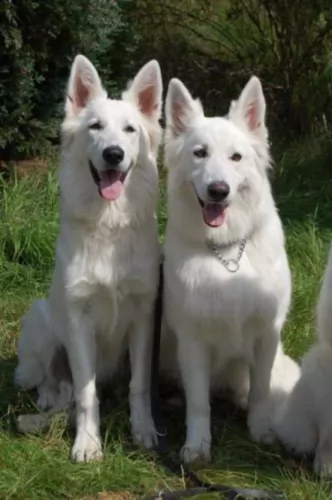 Apart from your Berger Blanc Suisse puppy need an excellent quality puppy food 4 times a day, as he gets older you will need to adjust his food to suit his high energy needs. Once your pet reaches a year of age you will know whether he requires one or two helpings of food a day. You can feed him a top quality commercial manufactured food or you can make your own home-made food for him which includes meat, rice and vegetables.
Apart from your Berger Blanc Suisse puppy need an excellent quality puppy food 4 times a day, as he gets older you will need to adjust his food to suit his high energy needs. Once your pet reaches a year of age you will know whether he requires one or two helpings of food a day. You can feed him a top quality commercial manufactured food or you can make your own home-made food for him which includes meat, rice and vegetables.
You want to make 100% sure he is getting the correct dosage of minerals and vitamins to ensure good health. To keep his eyes bright and his nose wet, include some raw meat into his diet as well. Make sure that he always has access to fresh, cool water.
Remember that your Berger Blanc Suisse is a working dog and he will need plenty of exercise. Apart from taking him on long walks, you can throw balls for him, buy rope toys for him and give him some rough and tumble. He is an intelligent breed and he will require some games that give him mental stimulation too.
Check regularly for fleas and ticks. You’ll pick this up with brushing his beautiful coat. Frequent brushing will help keep your dog clean and also remove all those loose hairs. Your White Swiss Shepherd Dog is a moderate, but constant shedder as well as being a heavy seasonal shedder so you will need to give him a good brush at least twice a week.
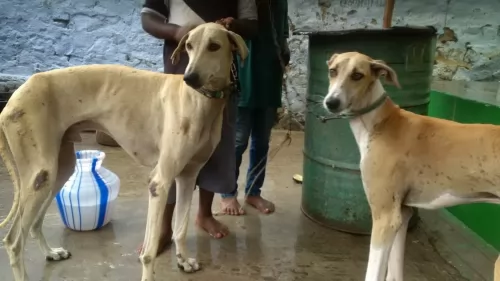 Do not overfeed your Chippiparai. Feed twice a day and no more than a total of 2.5 cups of high quality dry food.
Do not overfeed your Chippiparai. Feed twice a day and no more than a total of 2.5 cups of high quality dry food.
As mentioned previously the Chippiparai seems to have no genetic diseases or issues and very few acquired ones. However, he is sensitive to anesthesia and some foods. He is intolerant to cold weather and has a hard time with his pads on hard surfaces. Some Chippiparai might experience some of the ailments other breeds like them experience.
Both Elbow and hip are possible. This can cause arthritis and lameness. This occurs when the bone does not fit well into the joint.
This can cause lameness as well. The kneecaps slide over the knee instead of staying in place.
This is a hunting dog and he will want to hunt. They are incredibly fast and need the opportunity to run. Brisk walks will not be enough for this dog. He is very energetic. They will chase any small animals. It is not recommended that you have small pets even small dogs or cats with a Chippiparai. Having been bred for centuries to hunt, they are not likely to respond to any commands if they are off lease and chasing prey. Do not allow them to be off leash unless in a fenced area, and that fence needs to be 8 feet tall as they can easily jump a seven-foot fence. Try they at coursing, agility, fly ball and frisbee competitions.